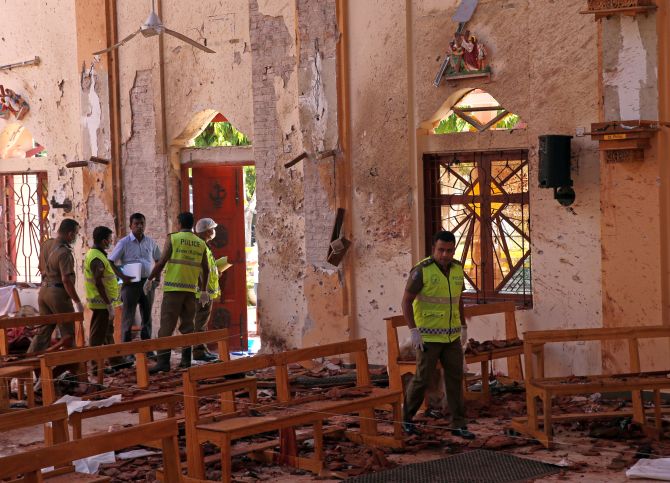 | « Back to article | Print this article |
The National Tawheed Jamath, a local outfit, is suspected of plotting the terror attack.

Seven suicide bombers were involved in a series of eight devastating blasts that tore through churches and luxury hotels in Sri Lanka on Easter Sunday, killing 290 people and wounding 500 others in the worst terror attack in the country's history, authorities said on Monday.
The blasts targeted St Anthony's Church in Colombo, St Sebastian's Church in Negombo and Zeon Church in Batticaloa when the Easter Sunday mass were in progress.
Three explosions were reported from three five-star hotels -- the Shangri-La, the Cinnamon Grand and the Kingsbury.
No group claimed responsibility for Sunday's attacks. The police have arrested 24 people, but declined to give further details.
'The attacks, which had taken place at the Shangri-La, Kingsbury and Cinnamon Grand hotels and also at St Anthony's Church in Kotahena, St Sebastians Church in Katuwapitiya, and the Zeon Church in Batticaloa have been identified as suicide bombings,' the Sri Lankan government analyst's department was quoted as saying by the Sunday Times newspaper.
Hours after the six blasts, a seventh explosion rocked Colombo on Sunday.
When a police team entered a house in the north Colombo suburb of Orugodawatta to conduct a search on Sunday, a suicide bomber blew himself up, causing a concrete floor of a two-storey building to crash, killing three policemen in the eighth blast.
'A total of seven suicide bombers carried out these explosions,' the department said.
A local outfit identified as the National Tawheed Jamath is suspected of plotting the deadly Easter blasts, Health Minister and the government spokesman Rajitha Senaratne said.
All the suicide bombers are believed to be Sri Lankan nationals, Senaratne added.
Speaking at a press conference, the minister said the chief of national intelligence had warned the inspector general of police regarding probable attacks before April 11.
"On April 4, international intelligence agencies had warned of these attacks. The IGP was informed on April 9," Senaratne said.

The National Tawheed Jamath -- a radical Muslim group -- is suspected of plotting the deadly explosions, the minister said, adding, "There may be international links to them."
Senaratne sought police chief Pujith Jayasundera's resignation in view of the security lapse.
Rauff Hakeem, a minister and leader of the main Muslim party -- the Sri Lanka Muslim Congress, said it was lamentable that no preventive action had been taken despite the inputs.
"They have known this... the names have been given, identified, but (they) took no action," Hakeem said.
Two Sri Lankan Muslim groups -- the All Ceylon Jamiyyathul Ulama and the National Shoora Council -- have condemned the blasts and offered condolences to the Christian community.
Over 290 people, including six Indians, were killed in the blasts that left more than 500 others injured, police spokesman Ruwan Gunasekera said.
24 suspects, Gunasekera said, have been arrested and been transferred to the criminal investigation department's custody for further investigation.
The government has said it will not disclose details of the suspects involved in the attacks to prevent them from getting publicity.
"Don't give extremists a voice. Don't help to make them martyrs," Defence Minister Ruwan Wijewardene told reporters when asked for details of those in custody.
Media reports said there was prior intelligence warning that the National Thowheeth Jamath was planning suicide attacks targeting prominent churches in Colombo.
Prime Minister Ranil Wickremesinghe has said an investigation must be launched as to why intelligence reports warning of the attack were not taken seriously.
President Maithripala Sirisena has appointed a three-member committee to conduct investigations.
Supreme court judge Vijith Malalgoda, former IGP N K Ilangakoon and former law and order ministry secretary Padamasiri Jayamanne have been appointed as members of the committee.
The committee has been instructed to submit a report on the Easter explosions within two weeks to the president.

The driver of the van which carried explosives for the attacks at the three hotels has been arrested.
A safe house where the bombers lived for nearly three months leading to the attacks was located in the Colombo south suburb of Panadura.
The Sri Lankan air force said it discovered an improvised explosive device along a road leading to the departure terminal at Colombo international airport on Sunday night.
"It was a crude six-foot pipe bomb found by the roadside," an air force spokesman said. "We removed it and safely defused it at an air force location."
Sri Lanka on Monday lifted the curfew imposed after the eight blasts.
The blasts, the deadliest attacks in the country's history, shattered a decade of peace in the island nation since the end of the brutal civil war with the LTTE.
The civil war ended with the defeat of the Tamil Tigers, who had fought for 26 years for an independent homeland for the minority ethnic Tamils.
The war is thought to have killed between 70,000 and 80,000 people.
The nation has seen some sporadic violence since.
In March 2018, a state of emergency was declared after members of the majority Buddhist Sinhala community attacked mosques and Muslim-owned properties.